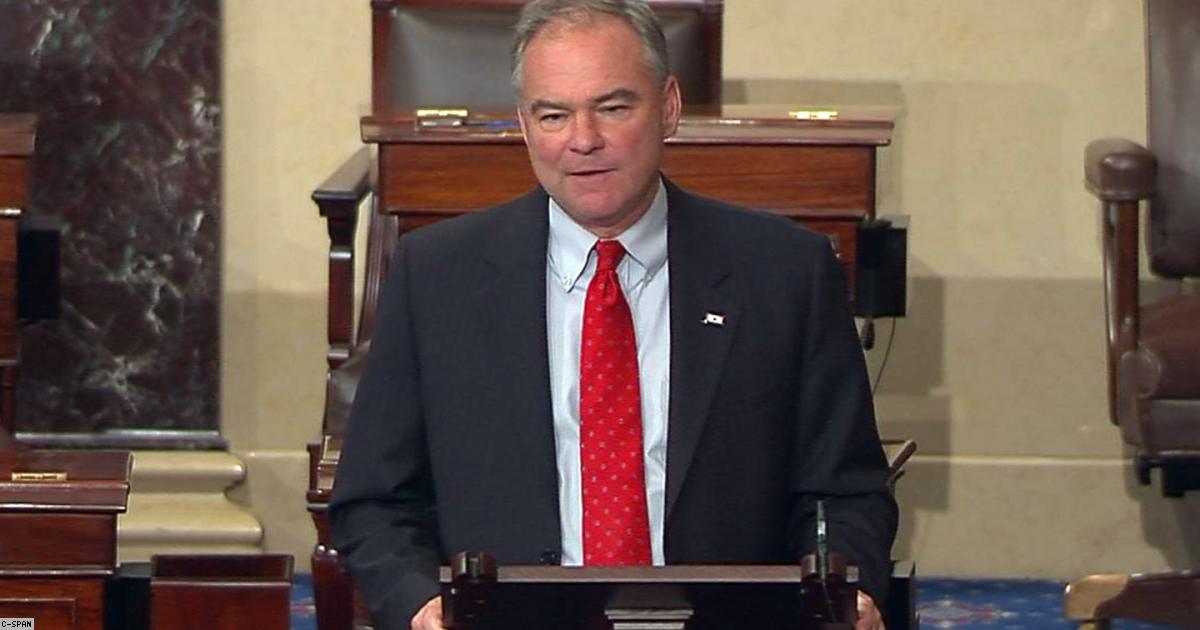Fox News anchor Bret Baier’s wise prediction that Virginia Sen. Tim Kaine (above) will be Hillary Clinton’s pick for a running mate further exposed the Bernie Sanders dead-enders as a naïve crowd lacking in any concept of reality politics.
On Facebook, the “Bernie Bros” scoffed in response to Kaine as possible VP nominee, with responses such as, “Who the hell is this guy?” I would suggest that anyone whose political knowledge is limited to the Sanders campaign – anyone who is not familiar with most or all of the 100 senators – is not very well qualified to comment on the overall political scene.
Kaine is a former lieutenant governor and governor of Virginia, one of the few key states in presidential general elections, and a former Democratic National Committee chairman. Baier’s prediction overlapped nicely with a Kaine interview over the weekend by C-SPAN which demonstrated the senator’s upbeat personality and enthusiasm for the Democratic ticket.
Kaine also talked about the invaluable experience he received – a political foundation in nonpartisan problem-solving — as a Richmond Va. city councilman and mayor during trying times.
Kaine is a moderate with foreign policy credentials who would have far more widespread voter appeal in the fall than Massachusetts Sen. Elizabeth Warren, whose one-note song – however articulately espoused – is economic populism. He is not an “identity politics” pick, but he would be a solid pick.
Some Sanders supporters seem to believe that Clinton has the foreign policy aspects of the presidency “covered.” Think again. Her actions during the Arab Spring, especially her hawkish and perhaps faulty views on destroying Gadhafi and his Libyan regime could become a nagging problem in the fall campaign, even against a simpleton like Donald Trump. And just the mention of Libya forces the former secretary of state to engage in counterproductive discussions about Benghazi.
As for Kaine’s supposed lack of a high profile, as a first-term senator he is certainly a far more prominent member of Congress and the Democratic Party than a congressional veteran like Sanders was just 15 months ago.
Michigan columnist Susan Demas, in a piece written for Dome Magazine, points out that the stubborn “Sanderistas,” who insist that their shining star can still somehow win the nomination at the Democratic National Convention in Philadelphia, would be better served by engaging in political activities at the local level to keep Bernie’s “political revolution” simmering.
The Michigan primary in March provided the Vermont senator with his most noticeable victory, but the ripples of that win here seem barely perceptible in June.
Why, Demas asks, are those from Bernie’s left-wing fan club in the Great Lakes State not running for local office or signing up with grassroots political groups that focus on issues such as abortion access or LGBT rights? Why not engage with nonprofit groups eager to have an impact on redistricting reform or environmental issues?
Instead, quixotic visions of Sanders sparking a future Tea Party on the left have taken hold as many delusional Bernie Bros seem almost eager to sabotage the Democratic nomination of Clinton.
Here’s more from Demas:
It’s fun to cheer at rallies and post memes on Facebook. But that’s being a fan, not making social change.
The real work of politics is hard. It’s knocking on doors and calling donors. It’s making compromise after compromise to try and win something that will make people’s lives better, like Obamacare, even if it’s not ideal. It’s grinding and demoralizing, but completely necessary.
Is that the kind of work Sanders supporters are willing to do? I don’t know. Some will use the excuse that Clinton is so distasteful that they’re through with politics, (although they were never going to stick around anyway if their kindly grandpa hero didn’t win). Some will find the incrementalism of social change too hard to bear.
I sympathize. But that’s our system. And I’ll take that kind of order over a radical like Trump, who’s threatened to mess with the First Amendment and the principle of an independent judiciary. Revolutions aren’t all they’re cracked up to be.




